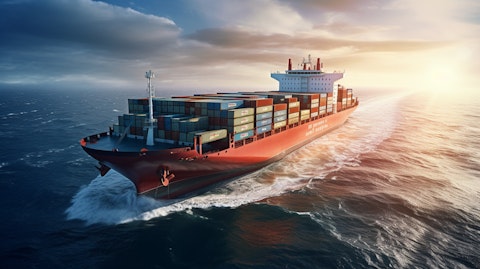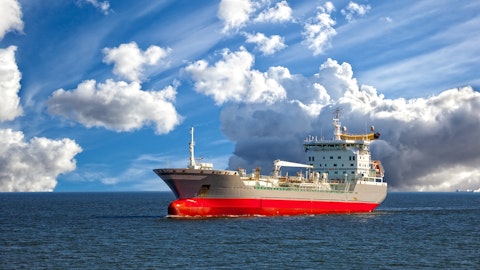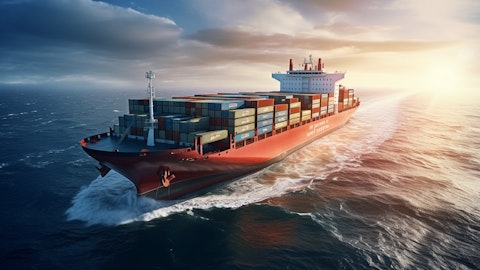Costamare Inc. (NYSE:CMRE) Q1 2024 Earnings Call Transcript May 10, 2024
Costamare Inc. beats earnings expectations. Reported EPS is $0.63, expectations were $0.6. Costamare Inc. isn’t one of the 30 most popular stocks among hedge funds at the end of the third quarter (see the details here).
Operator: Thank you for standing by ladies and gentlemen and welcome to the Costamare Inc. Conference Call on the First Quarter 2024 Financial Results. We have with us Mr. Gregory Zikos, Chief Financial Officer of the company. [Operator Instructions] I must advise you that this conference is being recorded today, Friday, May 10, 2024. We would like to remind you that this conference call contains forward-looking statements. Please take a moment to read slide number two of the presentation which contains the forward-looking statements. And I will now pass the floor to your speaker today, Mr. Zikos. Please go ahead sir.
Gregory Zikos: Thank you, and good morning ladies and gentlemen. During the first quarter of the year, the company generated net income of about $94 million. As of quarter end, liquidity was close to $1.1 billion. In the containership sector, charter rates have seen significant improvement from the end of last year. Demolition has fallen to levels below what was experienced during the first quarter of 2023. Although, cargo volumes have generally improved, the disruption in Red Sea is the main reason for the improved charter market. We have proactively secured deployment for 97% and 80% of our containership fleet for 2024 and 2025 respectively, generating contracted revenues of $2.3 billion with a remaining time charter duration of 3.4 years.
On the dry bulk side, as part of our strategy to renew the fleet and increase its average size, we have agreed to acquire two more Capesize vessels and accepted delivery of one similar-sized ship. In total, we have acquired five Capesize vessels with an average age of about 12.5 years and disposed of a total of 10 smaller-sized ships, with an average age of 14 years. Our owned dry bulk vessels continue to trade on a spot basis, while the trading platform is commercially managing a fleet of 54 ships. As mentioned in the past, we have a long-term commitment to the dry bulk sector which has been a strategic decision for us. Regarding Neptune Maritime Leasing, the platform has been steadily growing having concluded leasing transactions for 24 ships in total on the back of a healthy pipeline extending over the coming quarters.

Moving now to the slide presentation. On Slide 3, you can see our first quarter results. Net income for the quarter was roughly $94 million or $0.79 per share. Adjusted net income was about $75 million or $0.63 per share. Our liquidity stands at about $1.1 billion. Slide 4. On the containership side, our revenue days are fixed 97% for ’24 and 80% for ’25, while our contracted revenues are $2.3 billion with a TEU-weighted remaining duration of 3.4 years. In parallel, we continue to charter all our dry bulk vessels in the spot market, having entered into more than 30 chartering agreements since our last earnings release. Slide 5. We do execute on our strategy to renew our fleet and increase its size. During the last quarters, we have acquired five Capesize and one Ultramax ship with an average age of 12 years.
And we also have disposed of 10 smaller vessels with an average age of 14 years. Slide 6 shows in more detail the S&P activity since our last earnings release. Slide 5 [ph], regarding CBI we have charted in 54 period vessels with the majority of the fleet being on index-linked agreements. On our leasing platform, we have already invested around $120 million. Since inception, NML has financed 24 assets through sale and leaseback transactions and has a very healthy pipeline going forward. Moving to Slide 8. We do have roughly available $116 million for financing of vessel acquisitions through hunting licenses. In addition, we continue to have a long uninterrupted dividend track record, boosted by strong sponsor support. Moving to Slide 9. Our liquidity stands at about $1.1 billion.
This liquidity gives us the ability to look for opportunities to grow the company on a healthy basis. Moving to Slide 10. Charter rates in the containership market have been rising lately across all segments, having benefited from the Red Sea disruption. The idle capacity remains at low levels at 0.6%. Moving to Slide 11, the final slide. You can see the recent dry bulk market trends in the spot and forward market. Charter rates remain volatile, however, trading higher than the first quarter of last year. The order book is at about 9% of the total fleet. With that, we conclude our presentation, and we can now take questions. Thank you. Operator, we can take questions now.
See also 36 Countries Where Gay Marriage Is Legal and 10 Worst-Performing Stocks Insiders are Buying in 2024.
Q&A Session
Follow Costamare Inc (NYSE:CMRE)
Follow Costamare Inc (NYSE:CMRE)
Receive real-time insider trading and news alerts
Operator: Thank you, sir. [Operator Instructions] Your first question comes from the line of Ben Nolan with Stifel. Please go ahead.
Unidentified Analyst : This is actually Prinolla [ph] on for Ben. But thanks for taking my question. I wanted to ask what the expectation is going forward for putting additional capital into Neptune Leasing.
Gregory Zikos : Yes. I mean, for Neptune Leasing, we have announced that we’re going to be investing up to $200 million of equity. The figure we have in our press release of around $120 million of equity already invested excludes back leverage, which like we’re going to be receiving over the next months. So the net amount actually invested after the back leverage is going to be committed. It’s actually lower. So from an equity perspective, I can say that we could definitely invest $150 million more of equity, and subject to our back leverage strategy and commitment, this amount could even go higher. Now in case there are deals that we feel that makes sense from a risk and return perspective, also considering our liquidity, we wouldn’t have a problem releasing this figure in case we would like to go north of that.
However, this is a bit premature now. As of today, I think we have more than enough capacity to grow further this platform, which provide returns that makes sense also considering the risk involved.
Unidentified Analyst : Great. Thank you so much.
Gregory Zikos : Thank you, Prinolla.
Operator: Thank you. [Operator Instructions] The next question is from Climent Molins with Value Investor’s Edge. Please go ahead.
Climent Molins : Good afternoon. Thank you for taking my question. I wanted to start by asking about the dry bulk fleet. Over the past year, you focused on expanding your Capesize exposure while divesting some smaller vessels. Asset values have increased significantly lately, but should we expect additional acquisitions going forward?
Gregory Zikos : Look, we have bought up to now five Capesize vessels and one Ultramax. We haven’t bought more vessel exactly for the reason you rightly mentioned that asset values have been going up, and the same applies for new buildings. So we are very sensitive regarding the acquisition price. If there is a correction in the market, most probably you’re going to see us entering into more S&P transactions. Otherwise, we will sit and wait. We don’t have to hurry. And there is no reason for us to grow based on deals that cannot be justified on the numbers. So it depends on market conditions, but there is no predetermined growth rate that we need to meet, quite the opposite. Our goal is to enter into transactions that do make sense and that they do cover our downside, of course, leaving some upside for our shareholders as well.
Climent Molins: Thanks for the color. And is it fair to assume that most of the dry vessels are currently operated in the spot market?
Gregory Zikos : For the time being, yes. You talk about our old dry bulk ships. I mean, up to now, we have been operating them in the spot market. However, again, it is subject to market conditions. If we take the view for like a period, it could make sense to lock some of them in like fixed rates, then this is something we could consider. There is no predetermined rule. We are flexible, and this is subject to market circumstances. Also, those vessels we bought, most of them or the majority of the dry backbone fleet, was bought in the summer of 2021, where prices were much lower. So by default, those ships, they have low leverage and their break-even levels are quite low. So there are no restrictions and there are no requirements from our lenders, or like from a cash break-even perspective to charter the ships at a minimum rate.
We have the flexibility. As you’ve seen, we also have the liquidity. So there are going to be opportunities, if it makes sense. Yes, some of the ships in the future might be chartered out for a period. It remains to be seen. But I’m afraid that, at this point, I cannot forecast how the market is going to go and what our decision is going to be.
Climent Molins: Thanks for the color. And final question from me. On the container ship side, are you currently seeing any opportunities, or do you believe asset values still remain somewhat elevated relative to underlying fundamentals?
Gregory Zikos: I think that, for the container ships, if you look at the new building prices, I think they are still at high levels, looking at it historically. Also, comparing those prices to the prices we had for the new buildings some years ago. Also, for second-hand ships, yes, we don’t see a lot of opportunities, considering where asset values are. I think it may take some time until after rates and values, which are correlated, see some correction. So we don’t see something that does make sense right now for us, considering our risk-reward approach. So there we sit and wait. What we have been doing, as already mentioned, we have proactively charted, on a forward basis, most of our fleet with a very solid charter coverage for like 24, where literally all our fleet is chartered, close to 97, which is actually close to 100%. And at 80% for next year, which provides us with great visibility going forward.
Climent Molins: Big thanks. That’s all from me. Thank you for taking my questions.
Operator: Thank you. [Operator Instructions] Seeing no further questions at this time, I would like to pass the call back over to Mr. Zikos for his closing remarks.
Gregory Zikos: Thank you very much for your interest in Costamare and for dialing in today. I hope we’re going to speak again soon during our next conference results call. Thank you very much.
Operator: Thank you. That does conclude our conference for today. Thank you all for participating. You may now disconnect your lines.
Follow Costamare Inc (NYSE:CMRE)
Follow Costamare Inc (NYSE:CMRE)
Receive real-time insider trading and news alerts




